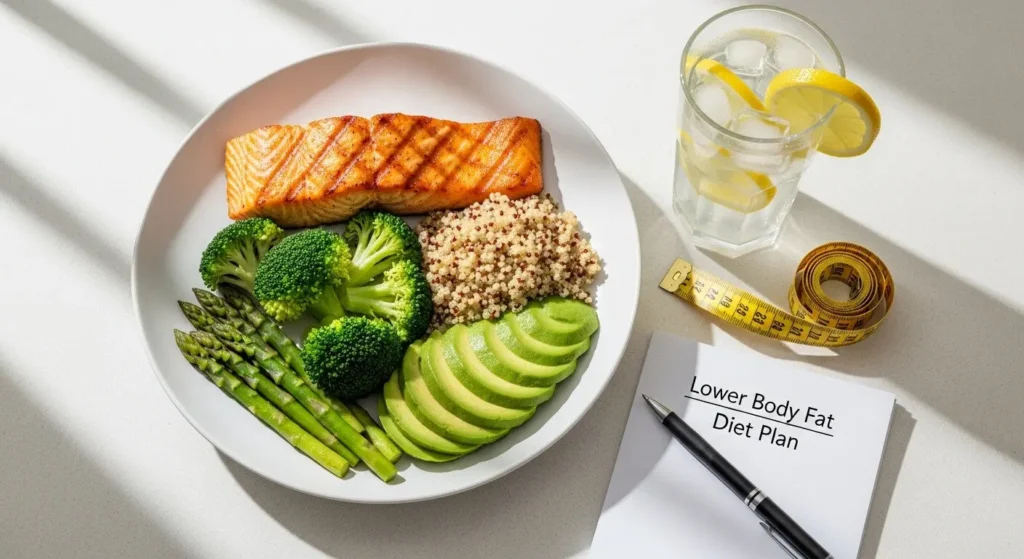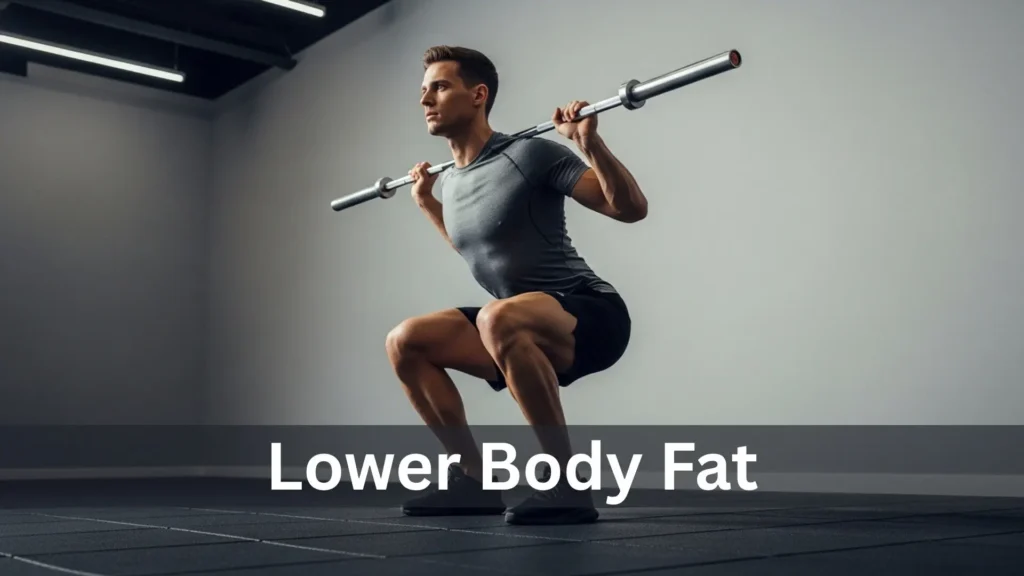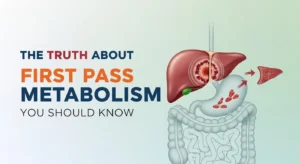Do you want to get rid of extra body fat and feel healthier? Many people wish for a leaner body, but it can seem like a big challenge. The good news is that you don't need to do anything extreme. By making a few simple changes to your daily life, you can speed up your body's ability to lower body fat and reach your goals.

This article will show you easy-to-follow habits that can help you transform your body, boost your energy, and improve your overall health. Let's dive into how you can make a real difference, step by step!
Body Fat Percentage Calculator 📏
Units: Centimeters (cm) and Kilograms (kg)
Please fill in all fields with valid numbers.
Your estimated body fat percentage is: %
Key Takeaways
- Eat Smart, Not Less: Focus on whole, unprocessed foods like lean protein, fruits, vegetables, and healthy fats to keep you full and fuel your body.
- Move Your Body Regularly: Combine strength training to build muscle and cardio to burn calories, helping your body become a fat-burning machine.
- Prioritize Sleep and Manage Stress: Getting enough sleep and keeping stress low are vital for your hormones, which play a big role in how your body stores fat.
- Stay Hydrated and Consistent: Drinking plenty of water helps your metabolism, and sticking to your habits every day is key to seeing lasting results.
- Listen to Your Body: Pay attention to how different foods and activities make you feel, and adjust your habits as needed for the best fat loss journey.
Understanding Body Fat: More Than Just Looks
Before we talk about how to lower body fat, let's understand what body fat is and why it matters. Body fat isn't just about how you look; it's also important for your health. We all need some body fat to stay warm, protect our organs, and store energy. However, having too much body fat, especially around your belly, can lead to health problems like heart disease, diabetes, and high blood pressure.
When we talk about “lowering body fat,” we're aiming to reduce the amount of fat your body stores while keeping or even building muscle. This is different from just losing weight, which can mean losing muscle and water too. Our goal is a healthier body composition.

Why Fat Loss Can Feel Slow
Sometimes, it feels like fat loss takes forever! This can be frustrating. Many things affect how fast you lose fat, such as:
- Your Genes: Some people naturally store fat differently than others.
- Age: As we get older, our metabolism (how fast our body burns calories) tends to slow down.
- Hormones: Hormones like insulin, cortisol, and thyroid hormones play a big role in fat storage and burning.
- Lifestyle: Your diet, how much you move, and even your sleep habits all have a huge impact.
But don't worry! Even with these factors, simple habits can make a big difference. It's about being consistent and making smart choices.
Simple Habits to Lower Body Fat Fast
To lower body fat effectively, we need to focus on a few key areas: what you eat, how you move, and how you take care of your body overall.
1. Eat for Fuel, Not Just for Fun
Your diet is probably the most important part of lowering body fat. It's not about starving yourself, but about making smarter food choices.
Focus on Whole Foods
Think about foods that come from nature, not a factory. These are called whole foods.
- Lean Protein: Protein helps you feel full, builds muscle, and requires more energy for your body to digest. This means your body burns more calories just by eating protein!
- Examples: Chicken breast, turkey, fish (like salmon and tuna), eggs, Greek yogurt, beans, lentils, tofu.
- Plenty of Vegetables: Vegetables are packed with vitamins, minerals, and fiber, but they're low in calories. They fill you up without adding extra fat.
- Examples: Broccoli, spinach, kale, bell peppers, carrots, cucumbers, leafy greens. Aim for a rainbow of colors!
- Healthy Fats: Yes, fats can be healthy! They are important for your hormones and make you feel satisfied. Just remember, a little goes a long way as they are high in calories.
- Examples: Avocados, nuts (almonds, walnuts), seeds (chia, flax), olive oil.
- Complex Carbohydrates: These give you steady energy and fiber. Avoid sugary drinks and processed snacks.
- Examples: Whole grains like oats, quinoa, brown rice, sweet potatoes, whole-wheat bread.
Control Your Portions
Even healthy foods can lead to fat gain if you eat too much. Learn what a healthy portion looks like. You don't need to count every calorie, but being aware helps.
- Use smaller plates: This trick can make your meal look bigger.
- Listen to your body: Eat until you're satisfied, not stuffed.
- Measure occasionally: Use measuring cups or a food scale now and then to get a better idea of proper portion sizes.
Limit Sugary Drinks and Processed Foods
These are often empty calories that don't fill you up but add a lot of sugar and unhealthy fats. They are major reasons people struggle to lower body fat.
- Sugary drinks: Sodas, fruit juices (even 100% juice can be high in sugar), sweetened teas, fancy coffee drinks.
- Processed foods: Chips, cookies, cakes, fast food, frozen dinners.
“Your kitchen is where fat loss truly begins. Fuel your body with purpose, and watch it transform.”
Consider Strategic Eating Windows
Some people find success with strategies like intermittent fasting, which involves eating only during certain hours of the day. This can help reduce your overall calorie intake and improve your body's ability to burn fat. You can learn more about how a 3-day fast for weight loss might fit into your fat loss journey.

2. Move Your Body: Exercise Smart, Not Just Hard
Exercise is crucial for burning calories and building muscle, which boosts your metabolism.
Strength Training is Your Friend
Building muscle is key to burning fat. Muscles burn more calories at rest than fat does. This means the more muscle you have, the more calories your body burns, even when you're just sitting around!
- How often: Aim for 2-3 times a week.
- What to do:
- Bodyweight exercises: Push-ups, squats, lunges, planks.
- Weights: If you have access to a gym or dumbbells, use them for exercises like squats, deadlifts, bench presses, and rows.
- Focus on big movements: Exercises that use multiple muscle groups (like squats or push-ups) are more effective.
Don't Forget Cardio
Cardio (like running, swimming, or cycling) is great for burning calories and improving your heart health.
- How often: Aim for 3-5 times a week.
- Types:
- Steady-state cardio: Walking, jogging, cycling at a moderate pace for 30-60 minutes.
- High-Intensity Interval Training (HIIT): Short bursts of intense exercise followed by brief rest periods. HIIT can be very effective for burning fat in less time. Example: Sprint for 30 seconds, walk for 90 seconds, repeat 8-10 times.
Stay Active Throughout the Day
Even small movements add up! Try to avoid sitting for long periods.
- Take the stairs instead of the elevator.
- Walk or bike instead of driving short distances.
- Take short breaks to stretch or walk around every hour.
- Stand while working if possible.
3. Sleep and Stress: The Hidden Fat Factors
Many people overlook sleep and stress when trying to lower body fat, but they are super important!
Get Enough Quality Sleep
When you don't get enough sleep, your body makes more of a hormone called cortisol (the stress hormone) and less of leptin (the hormone that tells you you're full). This can make you feel hungrier, crave unhealthy foods, and cause your body to store more fat, especially around your belly.
- Aim for 7-9 hours of sleep each night.
- Create a sleep routine: Go to bed and wake up around the same time every day, even on weekends.
- Make your bedroom dark, quiet, and cool.
- Avoid screens (phone, tablet, TV) at least an hour before bed.
Manage Your Stress Levels
Chronic stress also increases cortisol, which can lead to increased fat storage, especially in the abdominal area.
- Find healthy ways to relax:
- Meditation or deep breathing exercises.
- Yoga or gentle stretching.
- Spending time in nature.
- Listening to calming music.
- Spending time with loved ones.
- Hobbies that you enjoy.
“Your body needs rest to repair and recharge. Treat sleep as seriously as you treat your workouts and meals.”
4. Hydration: Drink Your Way to Fat Loss
Water is essential for almost every body function, including metabolism and fat burning.
- Boosts metabolism: Staying hydrated helps your body burn calories more efficiently.
- Reduces hunger: Sometimes, we mistake thirst for hunger. Drinking water before meals can help you eat less.
- Aids digestion: Water helps your body process food and remove waste.
- How much: Aim for at least 8 glasses (about 2 liters) of water a day. You might need more if you're exercising or in a hot climate.
- Tips:
- Carry a reusable water bottle with you.
- Add a slice of lemon 🍋 or cucumber 🥒 for flavor.
- Drink a glass of water first thing in the morning.
5. Consistency and Patience: The Long Game
You didn't gain body fat overnight, and you won't lose it overnight either. Consistency is the most important habit of all. Stick with your healthy eating, exercise, sleep, and hydration habits every single day, and the results will follow.
- Don't look for quick fixes: Fad diets or extreme workout plans are often hard to stick to and don't lead to lasting results. Focus on sustainable changes.
- Track your progress: This can be motivating!
- Take progress photos.
- Measure your waist circumference (body fat often shows up here first).
- Note how your clothes fit.
- Track your energy levels and mood.
- Celebrate small wins: Did you drink enough water today? Did you choose a healthy snack? Acknowledge your efforts!
6. Consider Supplements Wisely (Optional)
While diet and exercise are the main drivers for fat loss, some people explore supplements to support their journey. It's crucial to remember that supplements are not magic pills and should always be used in addition to a healthy lifestyle, not instead of it.
For example, products like Liv Pure are marketed to support liver function, which is involved in fat metabolism. Always research thoroughly and consult a healthcare professional before adding any new supplement to your routine.
7. Holistic Health and Men's Specific Concerns
Maintaining overall health, including specific health concerns, can also impact your body's ability to lower body fat. For men, prostate health is an important aspect of overall well-being. Issues with prostate health can sometimes impact energy levels and overall bodily function, indirectly affecting your ability to stay active and manage weight.
While not directly related to fat loss, ensuring your body is functioning optimally can support your fitness goals. If you're a man interested in learning more about maintaining prostate health, you might find resources on the most effective prostate supplements or how products like Prostavive tackle prostate problems. Understanding your choices for prostate supplements can be part of a broader approach to holistic health.
Putting It All Together: A Sample Day
Here’s what a day of simple fat-loss habits might look like:
| Time | Habit | Why it Helps |
|---|---|---|
| Morning | Drink a large glass of water upon waking. 💧 | Boosts metabolism, rehydrates, helps with hunger. |
| Eat a protein-rich breakfast (e.g., eggs, Greek yogurt). | Keeps you full, supports muscle, stabilizes blood sugar. | |
| Go for a brisk 30-minute walk or do a quick bodyweight workout. 💪 | Burns calories, boosts energy, improves mood. | |
| Mid-day | Drink water throughout the day. | Hydration, hunger control, metabolism support. |
| Eat a balanced lunch with lean protein, veggies, and healthy carbs. | Sustains energy, provides nutrients, avoids cravings. | |
| Take a short walk after lunch. 🚶 | Aids digestion, adds to daily movement. | |
| Afternoon | Choose a healthy snack (e.g., apple and nuts) if hungry. 🍎 | Prevents overeating at dinner, provides nutrients. |
| Evening | Cook a healthy dinner with protein and lots of vegetables. 🥗 | Nutrient-dense, low calorie, supports recovery. |
| Wind down, avoid screens an hour before bed. | Improves sleep quality, reduces stress. | |
| Aim for 7-9 hours of sleep. 😴 | Optimizes hormones, aids recovery, reduces cravings. |
Common Mistakes to Avoid
When trying to lower body fat, it's easy to fall into common traps. Here are a few to watch out for:
- Doing too much too soon: Starting with extreme diets or workouts can lead to burnout or injury. Make small, steady changes.
- Ignoring hunger cues: Starving yourself can slow your metabolism and lead to indulge eating. Eat when you're truly hungry, but choose wisely.
- Focusing only on the scale: The number on the scale doesn't tell the whole story. Muscle weighs more than fat, so you might be losing fat and gaining muscle without the scale moving much.
- Not tracking anything: While you don't need to be obsessive, keeping a simple food journal or tracking your workouts can help you see where you can improve.
- Giving up after a slip-up: Everyone has off days. Don't let one bad meal or missed workout derail your entire progress. Just get back on track the next day!
Conclusion
Lowering body fat doesn't have to be complicated or overwhelming. By focusing on simple, consistent habits related to your diet, exercise, sleep, stress management, and hydration, you can make significant progress. Remember, it's a journey, not a race. Be patient with yourself, celebrate every small victory, and focus on building a healthier, stronger you. Your body will thank you for these positive changes!








